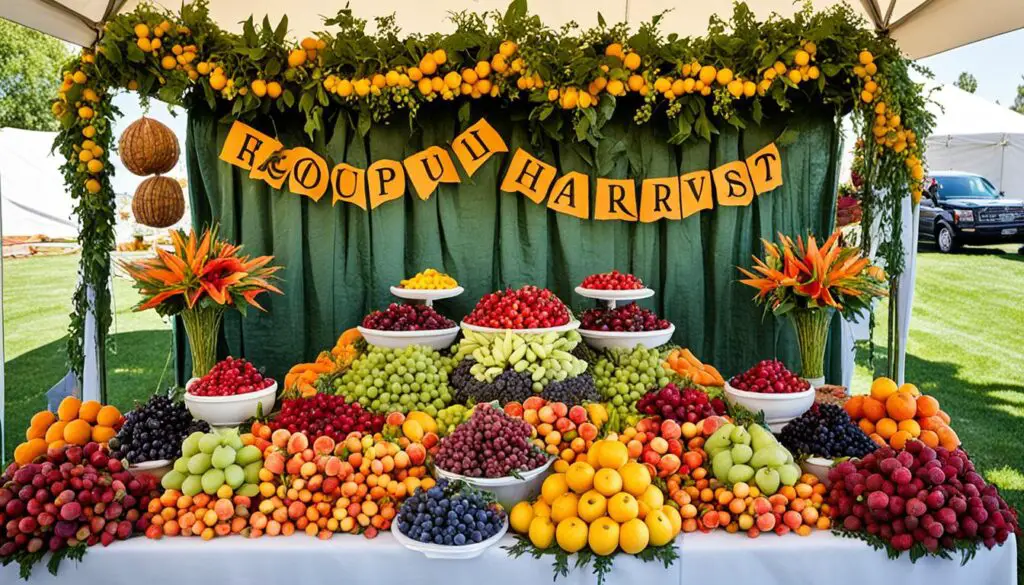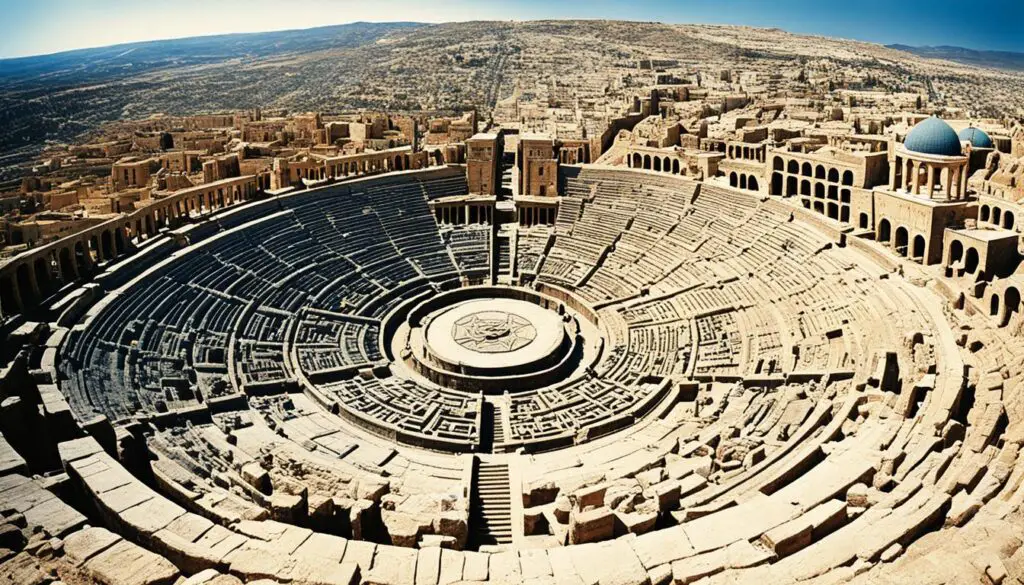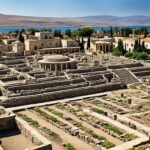Welcome to our exploration of Succoth in the Bible’s history! Succoth, also known as the Feast of Tabernacles, holds great significance for the Jewish people. It commemorates the time when the Israelites were sheltered in the wilderness and reminds us of God’s presence and provision. Let’s delve deeper into the biblical and historical aspects of Succoth.
Key Takeaways:
- Succoth is a major Jewish festival that symbolizes the dwelling of the Israelites in the wilderness.
- Succoth has both historical and theological significance for the Jewish people.
- The festival is linked to the birth of Jesus in the New Testament.
- Succoth celebrates the presence of God among His people and serves as a reminder of His faithfulness.
- The festival involves the erection of temporary booths and is accompanied by feasting and fellowship.
Historical Significance of Succoth
Succoth holds a deep historical significance as it commemorates an important chapter in the Israelite tradition. The festival serves as a reminder of the time when the Israelites wandered in the wilderness, living in temporary booths or succahs. This historical event represents the hardships and challenges faced by the Israelites during their journey.
“And the children of Israel journeyed from Rameses to Succoth, about six hundred thousand on foot that were men, beside children.”
– Exodus 12:37
Dwelling in these temporary booths highlights the faith and trust the Israelites placed in God’s provision and guidance. It is a testament to the Israelites’ unwavering belief in God even amid uncertain and difficult times.
In reflecting upon the historical significance of Succoth, it is important to recognize the relevance of this event to our own lives. It serves as a reminder that throughout history, people have faced challenges and uncertainties, yet their faith sustained them, and they found solace in the presence of God.
By examining the historical significance of Succoth, we can gain insight into the struggles and triumphs of our ancestors, finding inspiration to persevere in our own journeys.
Geographical Location of Succoth
Succoth, mentioned in the Bible, was a locality situated in the Jordan Valley. According to the etiological explanation in Genesis 33:17, it was named after the booths for cattle that were erected there by Jacob. Initially, Succoth belonged to the kingdom of Sihon and later passed to the tribe of Gad.
Succoth is identified with Ter’ela, known today as Tell Deir ‘Alla. It is located north of the junction of the Jabbok and the Jordan, within the region of Canaan.

Archaeological Discoveries of Succoth
Excavations carried out at the site of Succoth, identified as Tell Deir ‘Alla, revealed a settlement dating from the 15th century BCE to the period of the monarchy. The archaeological discoveries provide valuable historical evidence of Succoth’s existence and its significance in ancient times.
Traces of metallurgical industries were found at the site, confirming the presence of a thriving economy and aligning with biblical traditions. These findings suggest that Succoth was not only a temporary dwelling place for the Israelites but also a hub of skilled craftsmanship and trade.
“The archaeological discoveries at Succoth shed light on the material culture of the region and the economic activities that took place during the ancient times,” says Dr. Rachel Levy, an archaeologist and expert in biblical archaeology.
The excavation also uncovered the remnants of a Late Bronze Age sanctuary, providing further insight into the religious practices of Succoth. However, it was destroyed in the early 12th century BCE, possibly due to conflicts or natural disasters.
A particularly intriguing find at the site was a collection of unique clay tablets. These tablets, still undeciphered, hold the promise of uncovering additional historical information about Succoth and its significance in the ancient world.
| Archaeological Discoveries | Significance |
|---|---|
| Settlement dating from 15th century BCE | Establishes the historical existence of Succoth |
| Traces of metallurgical industries | Indicates a flourishing economy and skilled craftsmanship |
| Remnants of a Late Bronze Age sanctuary | Provides insights into the religious practices of Succoth |
| Ceramic tablets with unknown inscriptions | Potential for unlocking additional historical information |
These archaeological discoveries enrich our understanding of Succoth and shed light on the lives of the ancient inhabitants. Further excavations and research will undoubtedly unveil more secrets of this fascinating biblical site.
Theological Themes of Succoth
Succoth, also known as the Feast of Tabernacles, holds deep theological themes that are spiritually significant and symbolize faith and trust in God.
One of the key aspects of Succoth is the construction of temporary booths or succahs. These booths represent the transient nature of life and serve as a reminder to put our faith and trust in God’s provision. Just as the Israelites relied on God during their time in the wilderness, Succoth reminds us to rely on God’s guidance throughout our own journey.
Furthermore, Succoth is a celebration of God’s faithfulness. It commemorates His presence among His people and His provision for them in the past. As we observe this festival, we are reminded of God’s unwavering faithfulness, which encourages us to trust in His provision for our future.
“Succoth symbolizes the journey of faith and reliance on God’s guidance throughout life. It serves as a powerful reminder of God’s faithfulness and encourages believers to trust in His provision for the future.”
For believers, Succoth offers a time of reflection and renewal of our faith and trust in God. It is an opportunity to deepen our relationship with Him and find comfort in His presence. The festival invites us to pause and recognize the spiritual significance of placing our faith in God.
Ultimately, Succoth reminds us that our journey in life is temporary and that our true home is with God. Through embracing the symbolism and themes of Succoth, we can cultivate a deeper sense of faith, trust, and dependence on God, knowing that He is faithful to provide for us every step of the way.

Key Points:
- Succoth symbolizes faith, trust, and the presence of God.
- The temporary booths represent the temporary nature of life and the need to trust in God’s provision.
- Succoth serves as a reminder of God’s faithfulness in the past and encourages believers to trust in His provision for the future.
- It is a time to reflect on our journey of faith and reliance on God’s guidance throughout life.
- Succoth invites believers to deepen their relationship with God and find comfort in His presence.
Key Biblical Events Associated with Succoth
Succoth, as mentioned in the Bible, is linked to several key events that hold significant historical and theological importance. One such event is the time when the Israelites dwelled in temporary booths during their journey in the wilderness. This event showcases their reliance on God’s provision and protection as they embarked on their journey towards the Promised Land.
The dwellings in booths during Succoth symbolize the Israelites’ faith and trust in God’s presence during times of hardship and wandering. It serves as a reminder that even in the midst of uncertainty, God remains ever-present among His people.
Throughout the Bible, Succoth is associated with God’s faithfulness and the journey of the Israelites. It signifies their dependence on God’s guidance and the acknowledgment of His continuous presence throughout their struggles and triumphs.
Key Biblical Events:
- The Israelites dwelling in temporary booths during their journey in the wilderness
- Reliance on God’s provision and protection
- God’s faithful presence among His people

| Event | Description |
|---|---|
| The Israelites’ Exodus from Egypt | The Israelites celebrated Succoth during their journey towards the Promised Land, after being freed from slavery in Egypt. |
| The Wilderness Wanderings | During their time in the wilderness, the Israelites relied on God’s provision and protection as they dwelled in temporary booths. |
| The Feast of Tabernacles | Succoth is also known as the Feast of Tabernacles, a celebration of God’s faithfulness and provision. |
Cultural and Religious Practices of Succoth
One of the central aspects of celebrating Succoth is the observance of cultural and religious practices that have been passed down through generations. These practices are rooted in tradition and hold significant meaning for those who participate in the festival.
Traditionally, individuals erect their own succahs or booths in the precincts of their homes. These temporary structures symbolize the dwellings of the Israelites during their time in the wilderness. The succahs are constructed with branches, leaves, and natural materials to create a roof that provides shade and allows a view of the sky.
“The communal sukkah is a vibrant symbol of unity, both among Jewish people and within the community as a whole.”
In modern cities, where space is limited, communal sukkahs are often set up in the courtyard of synagogues or other communal spaces. These larger structures allow for the celebration of Succoth in a collective setting, fostering a sense of community and togetherness.
The succahs, whether individual or communal, are adorned with fruits and flowers, representing the harvest and abundance. It is common to see beautifully arranged displays of apples, pomegranates, grapes, and other seasonal fruits, as well as vibrant flowers. These decorations not only create a visually appealing ambiance but also serve as a reminder of God’s provision and the blessings of the earth.
“The festival involves feasting, fellowship, and spending time in the presence of God.”
During the festival, families and friends gather in the succah to enjoy meals together, often including traditional foods such as challah bread, honey, and dishes made from harvested crops. The succah becomes a space for fellowship, warmth, and gratitude as people come together to share in the celebration and reflect on the significance of the festival.

The Importance of Cultural and Religious Practices
Participating in the cultural and religious practices of Succoth allows individuals and communities to connect with their heritage, history, and shared beliefs. It is a time to reflect on the journey of the Israelites and their dependence on God’s provision in the wilderness. The temporary nature of the succah serves as a reminder of the transient nature of life and the importance of putting trust in God’s guidance.
By coming together in the succah, people create a space where they can experience the presence of God, strengthen relationships, and show gratitude for the abundance in their lives. The act of feasting and sharing meals also emphasizes the values of hospitality, generosity, and community.
| Key Elements of Cultural and Religious Practices of Succoth |
|---|
| Erecting individual or communal succahs |
| Decorating succahs with fruits and flowers |
| Gathering for meals and fellowship in the succah |
| Reflecting on the significance of the festival and expressing gratitude |
Prophetic and Eschatological Significance of Succoth
Succoth holds a profound prophetic and eschatological significance in the Bible, pointing to future events and the restoration of God’s kingdom. According to the prophecy in Zechariah 14:16, a time will come when all nations will celebrate Sukkot and gather in Jerusalem to worship the Lord. This universal celebration symbolizes the future reign of Jesus over all nations and the ultimate unity between Israel and the Gentiles.
The prophetic significance of Succoth highlights the fulfillment of God’s promises and His plan for the future. As believers, we eagerly anticipate the restoration of His kingdom and the realization of His divine purposes. Succoth serves as a reminder of this hope, inviting us to participate in the anticipation of God’s ultimate victory.
It is through this prophetic lens that we understand the eschatological importance of Succoth. The festival represents not only the celebration of God’s faithfulness in the past but also the expectation of His faithfulness in the future. Sukkot reminds us that God’s promises are steadfast and that His plans for redemption extend to all nations.
“Succoth is a glimpse into the future, a foretaste of the universal celebration when every nation will come to worship the Lord in Jerusalem. It is a proclamation of the coming reign of Jesus, the King of Kings, and the gathering of all people under His rule.”
As we observe Succoth today, we participate in the realization of this prophetic vision. We align ourselves with God’s plan for universal celebration and eagerly anticipate the day when all nations will gather in unity to worship Him. Succoth serves as a reminder of our role in the eschatological narrative and calls us to live with hope and expectation.
The Future of Succoth: A Universal Celebration
The future of Succoth holds the promise of a universal celebration, where people from every nation will come together to honor and worship the Lord. This vision of unity and inclusion is a testament to God’s love for all His creation, breaking down barriers and fostering deep fellowship between Israel and the Gentiles.
Sukkot, once a uniquely Jewish festival, will evolve into a global celebration, highlighting the universal reach of God’s redemptive work. The prophetic words of Zechariah 14:16 will become a reality, as people from every corner of the earth gather in Jerusalem to offer praise and thanksgiving.
| Prophetic and Eschatological Significance of Succoth | |
|---|---|
| Symbolizes the future reign of Jesus over all nations | |
| Represents the ultimate unity between Israel and the Gentiles | |
| Anticipates the fulfillment of God’s promises and the restoration of His kingdom | |
| Invites believers to live with hope and expectation | |
| Foretells a future where all nations will celebrate Sukkot and worship the Lord in Jerusalem | |
| Emphasizes the universal reach of God’s redemptive work |

As we reflect on the prophetic and eschatological significance of Succoth, let us embrace the hope, unity, and anticipation it represents. May we participate in the celebration of God’s faithfulness both in the past and in the future, trusting in His promises and eagerly awaiting the fulfillment of His kingdom.
Conclusion
In conclusion, Succoth holds great significance both historically and theologically for the Jewish people. While the observance of the festival may present challenges in modern times, its core themes of trust, reliance on God, and hope for the future remain relevant.
Succoth serves as a powerful reminder of God’s faithfulness throughout history, as depicted in the experiences of the Israelites. It calls us to celebrate His provision and to reflect on our own personal faith and trust in Him.
This festival not only connects us to our ancient roots but also offers a glimpse of the future hope we have in God’s promises. As we anticipate the fulfillment of His kingdom, Succoth inspires us to live with a sense of joy and expectation.
Let us not forget to celebrate God’s faithfulness in our own lives and embrace the timeless lessons of Succoth. It serves as a beautiful reminder that we can trust in God’s provision, find hope in His promises, and experience His presence in our daily journey.







